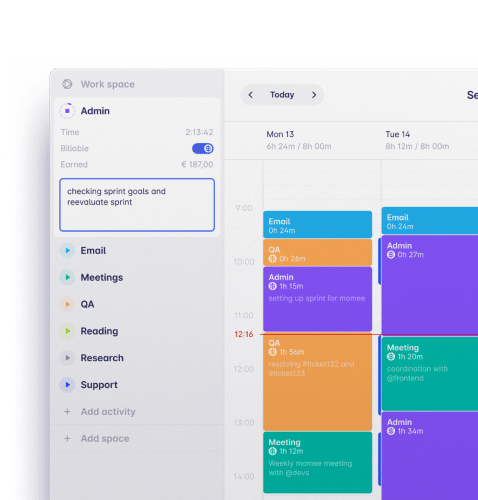How Consultants Are Compensated: 5 Top Approaches
In today’s environment, a consultant is a professional requesting advice on a specific area of expertise to a company or a person.
Most of the time, the necessity of a consultant has to do with the fact that someone needs help to grasp certain subjects in order to evolve in their actual job.

Track all your billable hours and charge more
How much time do you spent on each project? Check where your time goes and make sure to charge your clients adequately!
Without turning to a big company and spending too much, a consultant is a perfect choice due to their prices and customization advice. But how are consultants compensated, and how much do they charge?
It depends on the experience and type of consultant companies seek (strategy, operations, tactical or management consultant).
Being an independent freelancer as a consultant involves a fee that’s budgeted according to the services supplied. But after all the knowledge and the customization of assistance, the question remains:
- how are consultants compensated?
- what’s the best way to calculate and classify your billable hours to justify the work you’ve just done?
Through this article, you’ll be able to get the answer you were looking for. Lastly, you’ll see how time tracking is so important for a consultant.

How are consultants compensated?
Consultants can be compensated in various ways such as hourly rate, project-based fee, retainer, commission-based, and equity.
- Hourly rate: Some consultants charge an hourly rate for their services, which is typically based on their level of expertise, the complexity of the project, and the time required to complete it.
- Project-based fee: For larger consulting engagements, consultants may charge a flat fee for the entire project rather than hourly billing. This fee is typically negotiated upfront and is based on the scope of work and the expected deliverables.
- Retainer: Some consultants are engaged by clients on a retainer basis, which means they are paid a fixed amount each month to be available for a certain number of hours or to provide ongoing support or advice.
- Commission-based: In some cases, consultants may be compensated based on the results they achieve for their clients. For example, a sales consultant may receive a commission based on the revenue generated by their sales efforts.
- Equity: For start-ups or early-stage companies, consultants may be compensated with equity in the company instead of in addition to cash compensation. This can be a way for the consultant to share in the company’s success if it takes off.

Never miss a billable hour again
Timeular’s easy and smart experience, paired with its powerful reporting functionality, makes billing time a delight
The model of compensation depends on the consultant’s vision and goals. And it also depends on the agreement with the client. In summary, this is how consultants are compensated.
Read also: What are billable hours and their importance for revenue and profitability
How much should consultants charge?
Generally, consultants charge up to 100$ – 200$ per hour. But this rate can also be very flexible since it depends on the consultant’s experience, portfolio, and the client’s subject and/or project.
The more articulate and complex the project, the higher the fee, especially when you’re working B2B.

Why is time tracking important for consultants?
If you don’t know what time tracking is, we can sum up: the process of logging and monitoring how you spend your time.
Through time tracking, Consultants are able to log and monitor all of their work hours by task, client, or project.
In that way, they simplify their work routine because a consultant time tracking app can organize all the data you need to gather from your billable hours to create an invoice.
It’s important because they can consider how much time you dedicate to a particular subject and/or company and see how their resources are being used.
Because it’s not a usual day job, time tracking is perfect for collecting all of the hours that they used for every project, so everything is recorded.
Read also: How to get consulting clients
Benefits of time tracking for consultants

1. Transparency
When time is being tracked, consultants will be able to gather so much data that can help them get through to the client so that they can see how their resources and every hour of their billable work have been used in a particular project.
The consultant and the client can access everything with a complete and customizable report, so the communication is transparent.
This transparency promotes a better relationship between the consultant and the client, increasing trust and customer satisfaction and leading to a higher customer retention rate.
Customer retention vs. customer acquisition
Get to know the differences and how important they are for your business.
2. Performance
It’s important to have a healthy rhythm whilst working at an hourly rate.
With the help of time tracking, consultants can see what’s taking most of their time, what they should assign more of their time to focus on, and so on.
It’s essential to have a balance and not spend so much time on one thing and not at all on something else. With accurate data, consultants can optimize their efforts and increase performance.

3. Billable hours and profits
By tracking your billable hours, consultants are ensuring they’re being paid for every second of your work.
If a consultant thinks that billable hours aren’t important, they might change their opinion according to the findings of this survey:
Missing or inaccurate billable hours cost businesses $63807 per employee per year, which means $7.49 billion daily for the professional services sector providers in the US.
The same survey found that the industries that lose the most billable hours in the US are:
- Websites & Hosting
- Lawyers & Legal Services
- Construction and Engineering
- Advertising & Marketing
- Consulting & Accounting
- Software, IT & Support
So, can you see how vital billable hours are for a consultant’s revenue and profits? Increasing billable hours by ensuring accurate billing might be a game changer for consultants, their teams, and a company’s success.
So, they have to ensure that everything is accounted for so they don’t lose profits.

Track every billable minute worked across your whole team
4. Optimize your workload
Efficiency is an important keyword for consultants, and a time tracking platform will help them achieve that.
With the features of a time tracking app, they won’t have to waste time logging all of your hours manually or filling out reports; it can do it for you.
To get started on the usage of time tracking platforms, first, they need to define which tasks they are tracking the billable hours for.
They must be specific about every single detail. For example, if they’ve worked 5 hours on a Tuesday, they must take accountability for the declared hours so their client is informed and transparent.
Next, they’ll need to decide when to track the billable hours. Contestants must ensure to build a manual or automatic time tracking system. They need to sort out some details so that everything is clear and organized.
On that note, they have a final decision; Which platform will they use to submit billable hours? They can use an offline paper timesheet or a digital one with Microsoft Excel.
They can also gather the features that would stand out and research the best one that fits their needs.

Track time assigned to each client, project and activity to estimate your workload
6 Tips to improve work as a Consultant
Being an independent professional has its fair share of perks, but there can be a lot of cons, too, especially when thinking about payments.
But for everything to be organized and transparent between consultants and clients, consultants must check all of these boxes first:
- Set pricing sheet: To make sure that there are no surprises, have a pricing sheet prepared that consultants can share with any prospective client;
- Request a contract: For both parties to be safe and protected, there has to be a signed contract that is established for accountability;
- Simplify the payments: Sign up on every big money transaction app to facilitate all the money transfers they might receive from clients;
- Be quick with invoices: Be efficient and quick with invoices; it will show professionalism from their end;
- Gentle reminders: There are, and there always be forgetful clients, but it’s always healthy that consultants demonstrate reminders of things they need, such as payments;
- Update professional records: Consultants must develop their website and social media with their portfolio. Their potential clients will be able to see their experience and hire them.
TIP: Read our ultimate guide about consultant fees.
Conclusion
To sum up, consultants provide expert advice to companies or individuals.
There are several ways in which consultants are compensated. Generally, consultants charge between $100 – $200 per hour depending on their experience, area of expertise, and the client’s project.
Time tracking is essential for consultants to log and monitor their work hours. Time tracking provides many benefits, such as data to show clients how resources were used, optimizing performance, and ensuring accurate billing for every second of work.
Accurate billing promotes a better relationship between the consultant and the client. And at the same time, it’s crucial for a company’s success and the consultant’s revenue and profits.
You might be interested in: